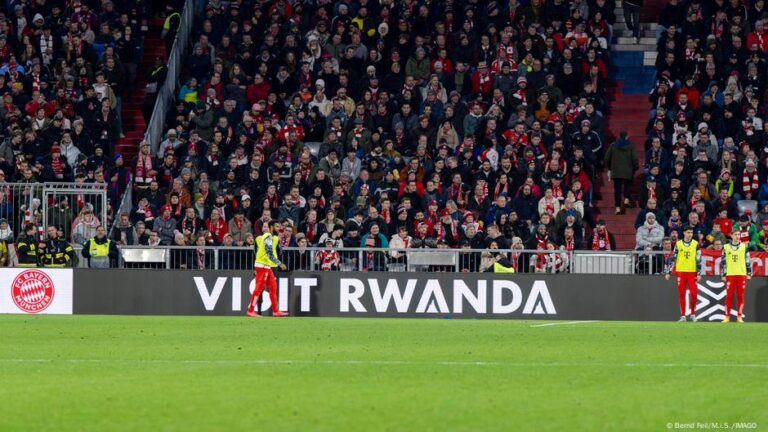For a significant section of their fans and many human rights activists, Bayern Munich had a moral obligation to end its commercial dealings with Rwanda. Last Friday, the German champions did just that. But rather than mentioning misgivings about human rights or the ongoing bloody war in DR Congo (DRC), Bayern spoke of a “strategic evolution.”
It was a move forced by fans and media, according to sports sponsorship expert Phil Lipperson.
“I believe that the external pressure led to the changes in the deal because in Germany, I think that the clubs are pretty exposed to criticism from the fan base. Fan bases in Germany are quite traditional and not open to commercial deals,” he told DW.
Though it will no longer display the branding of the government tourist board “Visit Rwanda,” Bayern will still maintain a relationship with the country, which is widely accepted to be funding M23, a rebel group who have captured territory, often in brutal fashion, in eastern DRC.
Deal always about more than money
This will be through what Bayern describe as a “dedicated partnership focusing on football development in Rwanda through the expansion of the FC Bayern Youth Academy in Kigali.”
Lipperson works for German agency DO IT!, which handles a number of sporting brands including Bundesliga 2 side Schalke. He argues that the development partnership, more than the €5 million ($5.85 million) a year that “Visit Rwanda” reportedly paid Bayern, was key in understanding why big European clubs hitch their reputation to nation states with questionable reputations.
“I think it’s the strategic expansion to emerge in different markets outside of Europe. In recent years we’ve seen it in Asia — India, Japan, China — and also North and South America, but Africa is still really a market not realized commercially for the big European clubs,” he said.
For Mohamed Keita, senior policy director for Africa at the Human Rights Foundation, Bayern’s motives are clear.
“I don’t believe that human rights or anything like that are the major driver behind this. If the club was, in fact, concerned about human rights, it would not be canceling part of the deal with Rwanda, while signing a new deal with Emirates Airlines two days earlier,” Keita told DW.
History repeating
Keita and Lipperson shared some level of surprise that Germany’s most successful, and richest, club would sign a deal with another country with a poor human rights record, given the negative PR associated with Rwanda and a previous deal with Qatar Airlines, which ended in 2023.
Keita also pointed out the internal politics have looked bad for Bayern, given that the father of coach Vincent Kompany was born in Congo and went on to become the the first Congolese mayor in Belgium and a member of the Belgian parliament.
In a speech earlier this year, Pierre Kompany made his position clear, saying his sympathies lay with children in Congo, whose parents and siblings were dead, lost or “buried in holes,” with “severed heads.” This is the day “we erase beliefs like ‘Visit Rwanda,'” he continued with tears in his eyes as the parliament passed a motion condemning Rwanda’s actions in the conflict, which is currently in an uneasy, US-brokered, ceasefire.
“It’s a completely crazy situation. It’s like having a having a club promote ‘Visit Russia’ with a coach that is half-Ukrainian. This is the kind of situation that the club put their manager in,” Keita said.
Can Bayern keep up with the super-rich?
While Bayern have a considerable and well-earned financial advantage over the rest of the Bundesliga’s clubs, German football ownership laws — which stipulate that club members must maintain overall voting control — and the active fan scene, which is generally anti-commercialization and globalization, mean Bayern may have some concerns about keeping up with English clubs and their enormous TV deals, or state-owned clubs like European champions Paris Saint-Germain (PSG), who are owned by Qatar.
Bayern are not alone in entering questionable deals. Earlier this week, Barcelona announced a partnership with DR Congo while Arsenal, Atletico Madrid and PSG still have commercial deals with Rwanda. None of the last three clubs responded to questions from DW about whether Bayern’s decision made them reconsider their own positions.
Given that recent World Cups have been hosted by Russia and Qatar and that the game’s governors, FIFA, are cosying up to US President Donald Trump ahead of the 2026 tournament and Saudi Arabia ahead of 2034, perhaps none of this should come as a surprise.
Bayern’s softening of the Rwanda deal is a welcome move for many, but it’s difficult to escape the impression that this came as a result of outside pressure and PR, rather than any question of morality.
Edited by: Chuck Penfold


